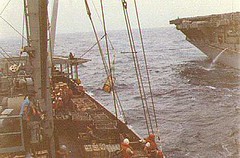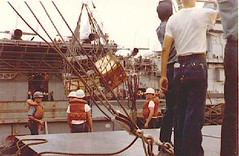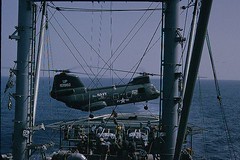Dragon Skin Backers Hammered on Hill
Military.com June 07, 2007
The technical expert solicited by a major news network to certify its tests of Dragon Skin body armor admitted Wednesday that the controversial vests weren't "ready for prime time."
In an investigative report broadcast by NBC May 20, the network used the expert opinion of Dr. Phillip Coyle - the former director of test and evaluation at the Pentagon during the Clinton administration - to certify results of side-by-side tests conducted at NBC's expense in Germany.
In testimony submitted to the House Armed Services Committee during a June 6 hearing in the issue, Coyle stated Dragon Skin - manufactured by Fresno, Calif.-based Pinnacle Armor - was "better … against multiple rounds and in reducing blunt force trauma" than the Army's current rifle-resistant Interceptor armor.
But after being confronted with conflicting information by lawmakers who questioned the NBC test results and provided Army-supplied data of vest failures from a May 2006 test, Coyle backed away from his staunch defense of Dragon Skin.
"You're saying today ... that you cannot say that it's ready for prime time. That's your testimony?" Rep. Duncan Hunter (R-Calif.) asked Coyle.
Coyle agreed that the NBC tests fell short of proving Dragon Skin was ready for fielding.
Alert: Tell your public officials how you feel about this issue.
Sitting beside Coyle at the hearing, Pinnacle president Murray Neal put forward a vigorous, if disjointed, defense of his product, telling lawmakers in written testimony the Army was manipulating test results, conducted unfair shots on his armor and released contradictory data to lawmakers and the media.
"Nothing jives, nothing makes sense," Neal told committee members. "The information coming from the Army is fraught with inconsistencies."
Video: Do U.S. Troops Have the Right Body Armor?
While calling the failure of his vest to stop a round on the second shot of the Army test a "once in a while" occurrence, Neal denied Army claims that a dozen more rounds penetrated his Dragon Skin vests.
He argued x-ray photos of one vest the Army claims failed showed the Dragon Skin disks had stopped the round.
"The bullet did not go through the armor," Neal said flatly.
Army officials responded by showing lawmakers a video clip of Neal inspecting the same vest after a test shot, watching engineers dig the penetrating round out of ballistic clay backing.
"Are you telling me if you were wearing this vest ... and that round hit you in the chest, would that have killed you or not?" a skeptical Rep. Gene Taylor (D-Miss.) asked Neal.
"No," he replied.
The Armed Services Committee hearing is the latest round in the long-simmering debate over Pinnacle's claims that its armor system - which uses a series of linked ceramic disks wrapped around a Soldier's body to stop armor-piercing rifle rounds - is better than the Army-issued Interceptor vest that uses four rigid ceramic plates.
At the request of Hunter and Sen. Kay Bailey Hutchison (R-Texas), the Army conducted a so-called "first article test" for Dragon Skin armor at a private ballistics lab in Maryland last year to see if the Dragon Skin technology met Army specifications.
Those tests resulted in 13 penetrations in 48 shots, the Army claims, including a full penetration on the second shot of the first test vest.
Investigators with NBC conducted their own series of tests at a German lab this spring, firing dozens of armor-piercing rounds at both Dragon Skin and a vest they said contained Army-issued plates, though Coyle cast some doubt on whether they were the same plates used by Soldiers in the field.
The NBC tests showed Dragon Skin absorbing many more rifle rounds than the Army vest, prompting Coyle's assertion that Dragon Skin was better than Interceptor armor.
Coyle, Neal and NBC are calling for another series of independent, side-by-side tests to prove once and for all which armor system is better.
"The best way to resolve this matter would be for the U.S. Army Test and Evaluation Command to conduct comparable side-by-side tests of both Interceptor and Dragon Skin body armor," Coyle said.
While Hunter subjected both Neal and Coyle to harsh questioning over their claims, the California lawmaker agreed that another round of tests is the only thing that will put the issue to rest.
"We need to straight away, in an expeditious way, to find out if there's value to this system," Hunter said. "And if there is value, we need to extract it as soon as possible and get it to the troops in the field."





















0 Comments:
Post a Comment
<< Home